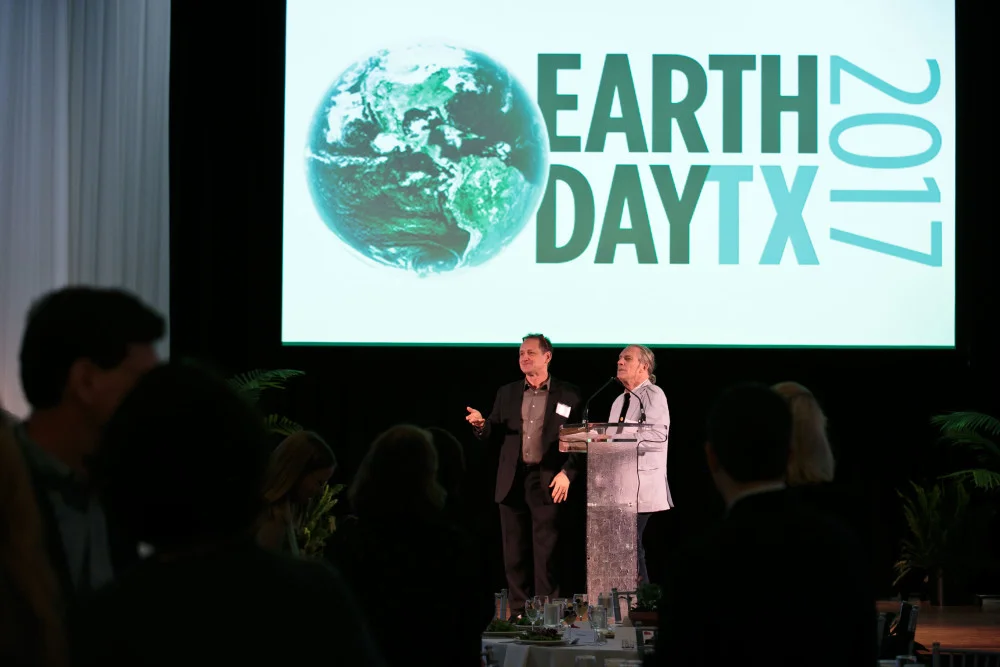Earth Day 50 Challenge: 2017 Recap
Future 500 CEO Bill Shireman and philanthropist and Earth Day Texas founder Trammell S. Crow at the 2017 Earth Day 50 Challenge convening. Image courtesy of Jason Kindig Photography.
Update: Our 2017 Earth Day 50 Challenge summary report is now available. Download it here!
This Earth Day we drew our largest group yet of corporate, environmental, academic, and philanthropic leaders to participate in the Earth Day 50 Challenge at Earth Day Texas — the largest Earth Day event in the world. Over three days, the Challenge explored our collective progress in advancing oceans, forests, and climate protection, and new opportunities for collaboration in an era of growing political uncertainty.
This is our third year facilitating a cross-sector, bi-partisan dialogue to address our most pressing environmental challenges head-on. The challenge began when environmental thought leader Trammell S. Crow, Jr. and I decided to bring together unlikely allies to collaborate on climate protection during the fledgling Earth Day Texas expo in 2015. Every year since, we have provided Challenge participants with a secure venue for civil discourse under the Chatham House framework–a system of anonymity which enables individuals to speak more freely about goals, challenges, works in progress and where they need help. The result is a free exchange of ideas and solutions that won’t be found at a typical sustainability conference or corporate roundtable.
Future 500 COO Erik Wohlgemuth moderates a panel at the Earth Day 50 Challenge. Images courtesy of Jason Kindig Photography.
In 2016, we prioritized the biggest threats to oceans, forests, and climate, and the market-based and supply-chain steps companies and others can take to protect them: forestry and fishery protection, ecosystem restoration, and carbon pricing. As a result, we released an extensive report on the current contributions companies have been making toward environmental protection, opportunities for collaborative action and the prospective corporate leaders yet to use their full resources and influence to take action.
“The Earth Day 50 Challenge highlights what is largely lacking in our national discussion: collaboration.”
This year, we took a step further in our mission. Our three-day agenda was packed with educational sessions, keynotes and breakout discussions around three major topics:
Carbon pricing momentum: Following the presidential election, advocates for market-based emissions reduction and maintaining US leadership in the Paris Climate Accords have rapidly come out of the woodwork. Politicians, corporate leaders and environmental advocates in attendance related that, despite setbacks in the Trump Administration, avenues of hope remain for US carbon pricing — such as through tax reform — especially if business leaders can be collaboratively encouraged to support it.
Forest protection & conservation: The last five years have been transformative in the rapid adoption of corporate commitments for use of recycled content, responsible sourcing of virgin fiber, and deforestation-free supply chain commitments. With established best practices and success cases in both the corporate and NGO spheres, the next step is to identify specific, measurable goals around which cross-sector coalitions can mobilize.
Setting the stage for plastics prevention: While acknowledging the outsized risk climate change poses for ocean ecosystems, Challenge participants honed in on ocean plastic pollution as a key area where there is currently significant global stakeholder interest and momentum. Stakeholders acknowledged that there are still major gaps in our understanding of the scope of this problem, but did not view this void as an excuse not to act. In fact, support for further research was identified as a promising opportunity to increase corporate engagement in ocean conservation, while companies encouraged attendees to expand their vision of circular economy principles to more effectively incorporate the entire plastics value chain.
Corporate, philanthropic, and NGO leaders are already making a massive positive impact on global oceans, forests, and climate, regardless of how Washington moves. Corporate leaders understand that sustainability is not a fad, but a strategy that outlives any one Presidential administration. The Earth Day 50 Challenge highlights what is largely lacking in our national discussion: collaboration. Through bridge-building efforts like ours, companies and environmentalists alike have a real chance of making Earth Day 2020 the starting point of a new, sustainable future.
In particular, we would like to thank Earth Day Texas and its founder, Trammell S. Crow, for enabling such a wide group of odd-bedfellows to collaborate. Without them, the Earth Day 50 Challenge would not be possible.
Learn more about The Future 500 Summit at EarthX (formerly The Earth Day 50 Challenge).
Future 500 is a non-profit consultancy that builds trust between companies, advocates, investors, and philanthropists to advance business as a force for good. Based in San Francisco, we specialize in stakeholder engagement, sustainability strategy, and responsible communication. From stakeholder mapping to materiality assessments, partnership development to activist engagement, target setting to CSR reporting strategy, we empower our partners with the skills and relationships needed to systemically tackle today's most pressing environmental, social, and governance (ESG) challenges.
Want to learn more? Reach out any time.
Blog posts by Bill:











